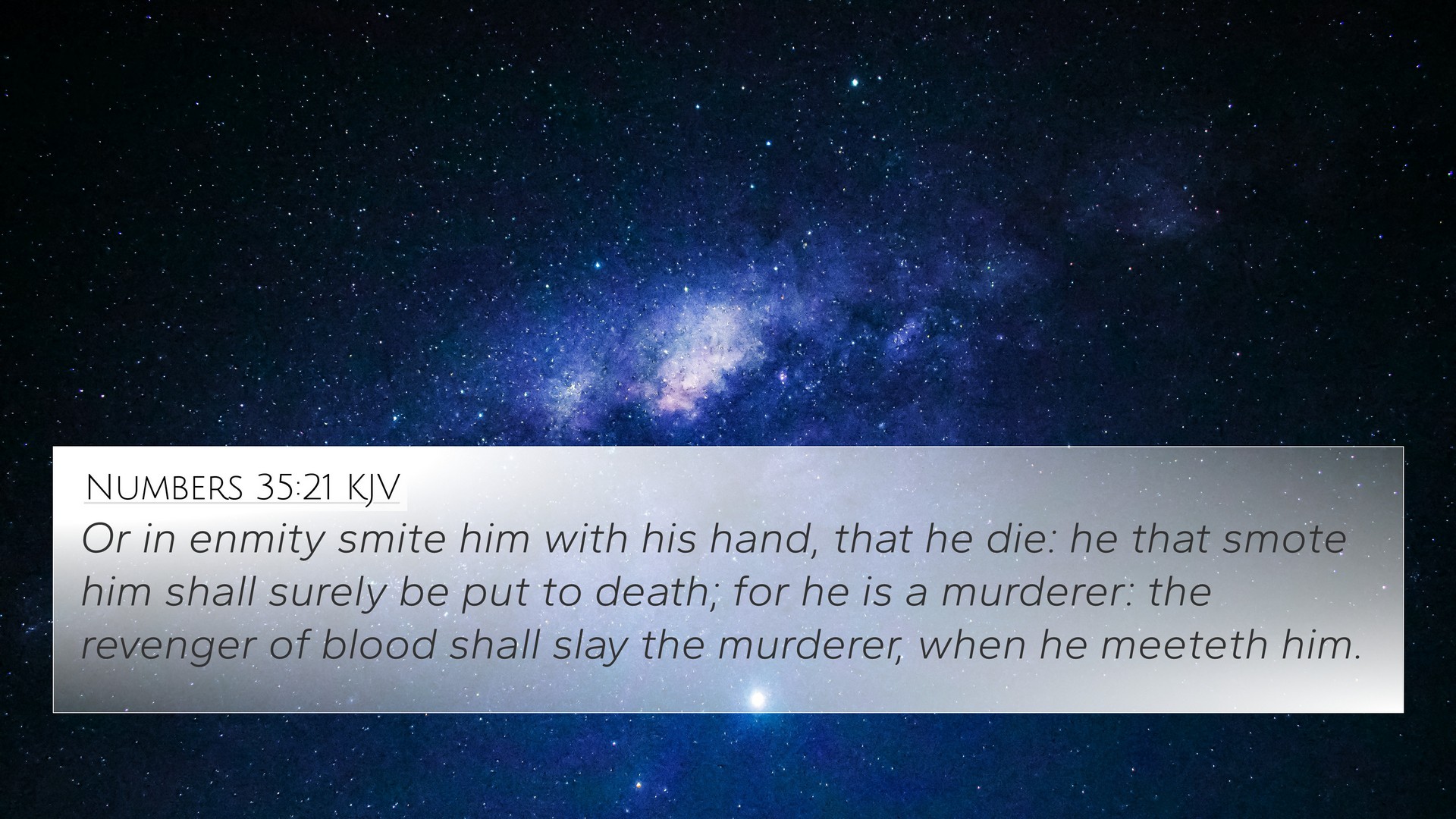Bible Verse Meaning: Numbers 35:21
Verse: Numbers 35:21 states, "Or if he struck him with his hand in enmity, that he died: he that smote him shall surely be put to death." This verse addresses the issue of intentional homicide and the consequences that follow.
Overview
This section of Numbers discusses the cities of refuge where those who accidentally kill someone can flee. However, Numbers 35:21 clarifies that intentional murder is a serious offense with dire consequences. The underlying principle emphasizes justice in the community and the sanctity of life.
Commentary Insights
- Matthew Henry: Henry emphasizes the importance of distinguishing between accidental and intentional acts of violence. He argues that the law reflects God’s view on justice, stressing that intentional murder must be punished to uphold societal order.
- Albert Barnes: Barnes highlights that the phrase "he that smote him shall surely be put to death" indicates a stringent approach to justice. He elaborates on the accountability of individuals for their actions, reinforcing the notion that premeditated actions have significant repercussions.
- Adam Clarke: Clarke provides a detailed explanation of the Hebrew words used in this verse, suggesting that the law serves as a deterrent against violence. He connects the concept of 'enmity' to broader themes of moral responsibility and the idea of retribution for intentional harm.
Cross-References
This verse can be linked to several other scriptures to provide a deeper understanding of its themes:
- Exodus 21:14: This verse also discusses premeditated murder and the penalty associated with it.
- Deuteronomy 19:11-13: Here, laws regarding intentional versus unintentional killing are clarified, emphasizing the need for justice.
- Matthew 5:21-22: Jesus reiterates the commandment against murder, expanding the understanding of anger and enmity.
- Romans 13:4: In this passage, Paul discusses the role of government in executing justice on wrongdoers, reinforcing the need for accountability.
- 1 John 3:15: John writes about hatred being equivalent to murder in God’s eyes, linking internal attitudes to external actions.
- Proverbs 6:16-19: This passage lists things God hates, including hands that shed innocent blood, highlighting the severity of murder.
- Genesis 9:6: A foundational verse where God establishes the principle of capital punishment for murder, stating the sanctity of human life.
Understanding the Thematic Connections
The themes present in Numbers 35:21 resonate throughout Scripture, particularly concerning justice, morality, and the sanctity of life.
Thematic Bible Verse Connections
This verse illuminates various interconnected themes in the Bible:
- Justice and Retribution: The necessity of justice serves as a filter that educates moral conduct within society.
- The Sanctity of Life: Each verse highlighting the seriousness of murder reflects God's stance on human life.
- Human Accountability: Linking this verse with others underscores the expectation of personal responsibility for one’s actions.
Practical Applications
Understanding Numbers 35:21 can help guide believers in their moral deliberations and community interactions:
- Moral Integrity: Followers of Christ are called to uphold righteousness in their dealings.
- Conflict Resolution: The verse encourages seeking reconciliation rather than engaging in hatred or violence.
- Leadership Responsibilities: Leaders are reminded of their duties to uphold justice and protect their communities.
Conclusion
Numbers 35:21 stands as a strong reminder of the principles of justice and accountability that permeate the Scriptures. By cross-referencing this verse with others, we can gain a more profound understanding of God's will regarding the preservation and respect for life.
SEO Keywords
Utilizing Bible verse cross-references such as those in Numbers 35:21 can enhance Bible study efforts. Tools for Bible cross-referencing enrich the study experience by uncovering connections between Bible verses, particularly how they outline God's character and justice.
Using a Bible concordance or cross-reference Bible study guide enables believers to find inter-Biblical dialogues that expand on similar themes of justice, enmity, and retribution, which are pivotal to understanding the full counsel of God. Through detailed comparative Bible verse analysis, students of the Word can explore how to find cross-references in the Bible that illuminate the depth of scriptural truth.


